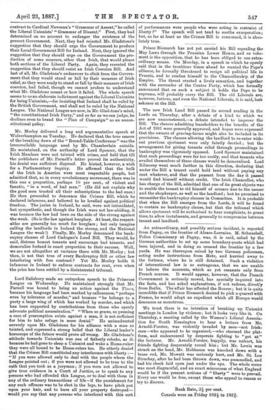Lord Salisbury made an outspoken speech to the Primrose League
on Wednesday. He maintained strongly that Mr. Parnell was bound to bring an action against the Times, because his language had been marked by callousness," perhaps even by tolerance of murder," and because "he belongs to a party a large wing of which has worked by murder, and which has been supported by contributions from those who openly advocate political assassination." "When so grave, so pressing a case of presumption exists against a man, it is not sufficient for him to take refuge in mere denial." He animadverted severely upon Mr. Gladstone for his alliance with a man no tainted, and expressed a strong belief that the Liberal leader's horoscope of the future would prove all wrong. Mr. Gladstone's attitude towards Unionists was one of fatherly rebuke, as ifs because he had gone to sleep a Unionist and woke a Home-ruler, they were all bound to be Home-rulers too. He utterly denied that the Crimes Bill constituted any interference with liberty
If you were allowed only to deal with the people whom the League pointed out; if you were not allowed to be true to the oath that you took as a juryman; if you were not allowed to give true evidence in a Court of Justice, or to speak to any persons who had offended this League, or to deal with them in any of the ordinary transactions of life—if the punishment for any such offences was to be shot in the legs, to have pitch put upon your hair, and to have all your property destroyed— would you say that any persons who interfered with this sort of performanoes were people who were acting in restraint of liberty ?" The speech will not tend to soothe exasperation ; but, so far at least as the Crimes Bill is concerned, it is abso- lutely true.


































 Previous page
Previous page